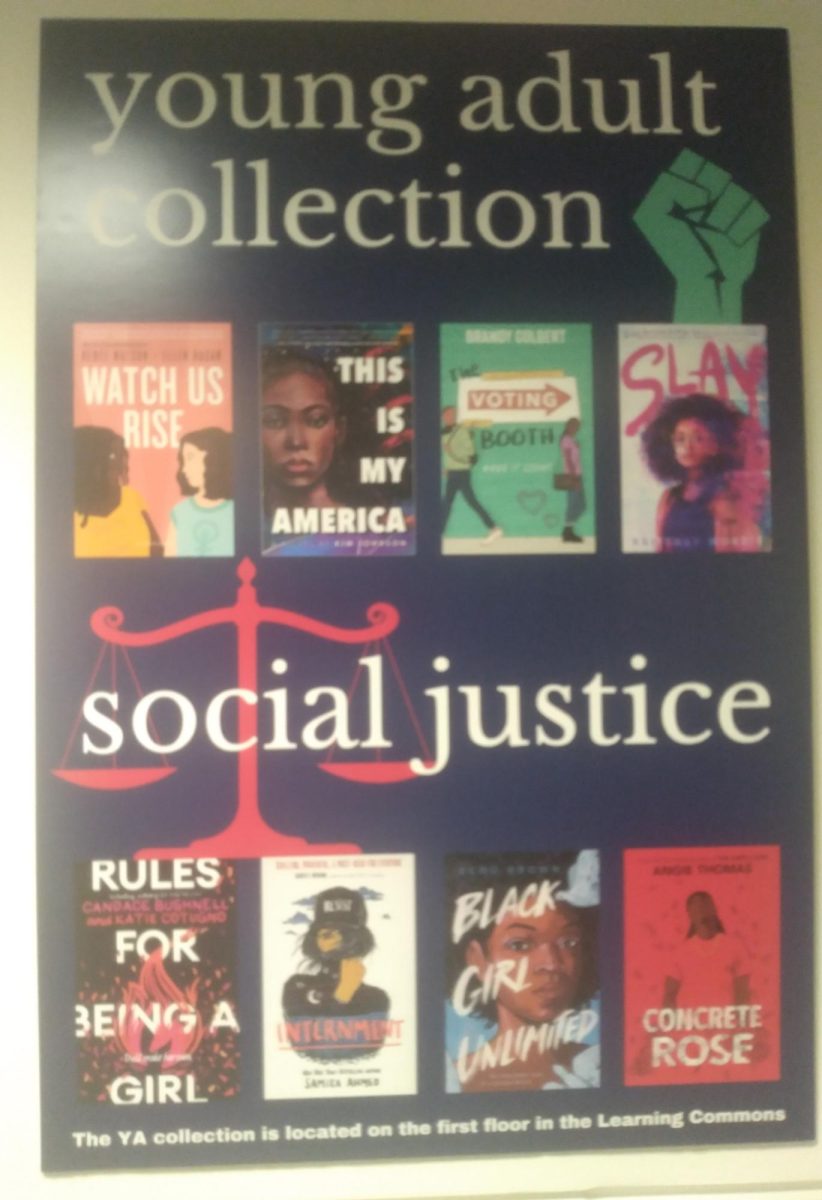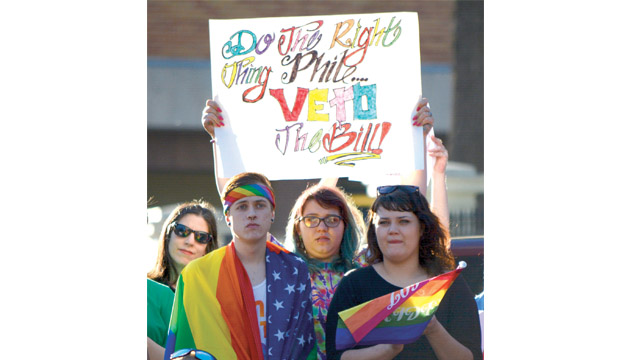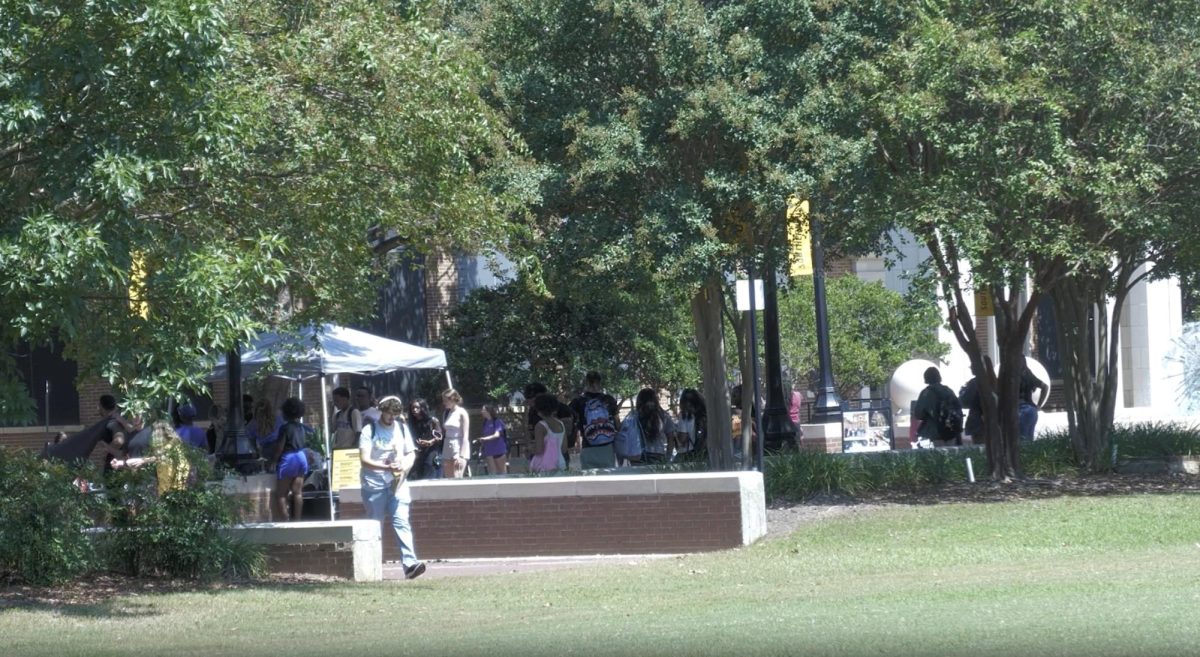Outside Gov. Phil Bryant’s mansion in Jackson on April 4, a throng of 200 or more activists gathered to defend LGBTQ+ rights from House Bill 1523, which would effectively allow businesses to discriminate on the basis of religion and traditional values.
Protesters pumped their fists and chanted, “No hate in our state” in an attempt to convince Gov. Bryant that signing the bill would be a mistake. This came less than two weeks after North Carolina Gov. Pat McCrory passed the infamous “bathroom bill” that disallowed transgender individuals to use public restrooms respective of their gender.
Though many LGBTQ+ individuals and supporters had been hopeful about the bill, there existed some who thought the governor would not be swayed. Activist and Fondren native Curtis Ellis found himself among the latter.
“Phil Bryant has not listened before,” Ellis said at the protest. “I don’t think he will listen [this time]. He is closed-minded and closed-eared.”
And sure enough, Gov.Bryant signed the bill the very next morning.
House Bill 1523, also known as the Protecting Freedom of Conscience from Government Discrimination Act, disallows officials to take punitive action against businesses that deny a person goods or services based on three convictions.
“Marriage is or should be recognized as the union of one man and one woman; sexual relations are properly reserved to such a marriage; and male (man) or female (woman) refer to an individual’s immutable biological sex as objectively determined by anatomy and genetics at time of birth,” wrote House Speaker Philip Gunn in the bill.
Gov. Bryant said the bill is meant to protect religious organizations from discrimination.
“Now, if you have a restaurant and said, ‘I want to have a wedding here,’ and it is not a traditional wedding — it is a gay marriage that is going to take place here — you would be able to say, ‘Gentlemen, I’m sorry, ladies, I’m sorry, I just have a religious belief, this is a religious ceremony as my faith tells me, and I can’t do that,” Gov. Bryant said in an interview on the JT Show half an hour after signing the bill.
In defense of the bill, Gov. Bryant said HB 1523 will help prevent government regulation of an individual’s decisions and constitutional rights by federal and state law.
“I’m a limited government type of guy, [and I] always have been,” Gov. Bryant said. “When I get a bill that says — and that’s exactly what this [bill] does — ‘it limits the government from discrimination against an individual because of their religious beliefs,’ I think that’s a good idea. Of course, religious beliefs [are] in the eye of the beholder, and that’s why we have to look to other criminal laws and civil laws that exist that protect us from someone acting in a dangerous or discriminatory manner.”
Hundreds gathered in front of the Governor’s Mansion in Jackson to assert that passing the bill would be discriminatory against LGBTQ+ community members.
Wanda Bingham, an activist at the protest, said she was determined to speak out.
“Injustice anywhere is injustice everywhere,” Bingham said. “That’s why we are standing here fighting. These people who don’t have the best interest of all the people in Mississippi. We are on a mission to get them out.”
Bingham made a passionate display at the protest and spoke although she was not planned to speak.
“What our governor has done here in the state of Mississippi, he has created a man-made disaster,” Bingham said. “He’s forcing us to live in a time that we aren’t in, and that’s not going to happen on my watch. It affects everyone.”
In signing the bill, Gov. Bryant has opened the doors to federal lawsuits. According to a memorandum published by Columbia University in New York on April 5, the day the bill was signed, HB 1523 violates the Establishment Clause of the Constitution in three ways.
“HB 1523 violates the Establishment Clause by allowing government employees to discriminate against Mississippians who are LGBT or do not conform to religious, sex and gender norms,” the notice said. “Several provisions of HB 1523 allow government employees — who represent the state and have sworn to uphold the law — to discriminate against LGBT and unmarried Mississippians based on their religious beliefs.”
According to the notice, the second way it violated the clause was that it allowed those who accepted government contracts and grants to discriminate based on religious beliefs. Lastly, the notice said accommodating to the religious preferences of a private group that harmed third party individuals in a meaningful way was unconstitutional.
Jackson native and professional drag queen Tara Shay Montgomery said the house bill is absurd.
“There’s a large amount of support here,” Montgomery said. “I think that shows Gov. Bryant that Mississippi does not want to continue to be known as the state that is the most obese, the poorest and the most held back. These people [at the protest] are saying, ‘Let’s move our state forward with the rest of the country.’”
Montgomery said she was optimistic about the bill being vetoed but felt that Mississippi is known for being stubborn.
“Gov. Bryant is just a reflection of Mississippi being set in its own ways,” Montgomery said.
From this event, questions will arise for Mississippi’s future regarding potential lawsuits and civil rights. The fight for lesbian, gay, bisexual, transgender and queer individuals is expected to continue in the South.
Though the protest did not sway Bryant, Ellis said he believes such activism can impact Mississippi’s future.
“But first we’ve got to impact [Mississippi’s] culture before we can impact the legislature,” Ellis said.





























